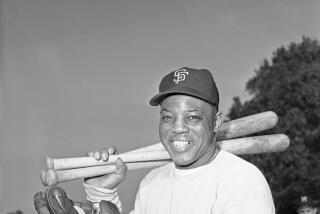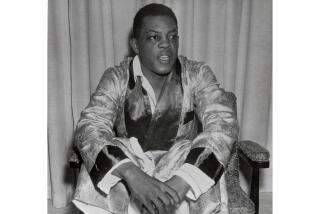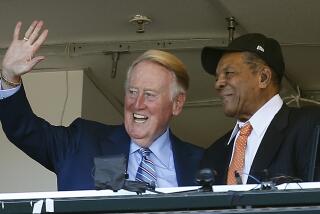Making the pitch, as seen on TV
- Share via
Billy Mays sounds tired, which is a huge relief to me. I had braced myself for the onslaught of moon-barking enthusiasm the bearded pitchman brings to his direct-response TV ads for OxiClean, Kaboom, Mighty Putty, the Awesome Auger, the Samurai Shark sharpener. The Billy Mays in those ads seems to have the same problem as the de-hibernated Austin Powers, who can’t control the volume of his voice.
But it’s late in Odessa, Fla., where Mays has his five-bedroom mini-mansion, and he is worn to a frazzle. The 50-year-old Pennsylvania native has been on the road for three weeks promoting his new reality show, “Pitchmen,” debuting April 15 on the Discovery Channel. After shilling dozens of products on zillions of two-minute commercials, Mays -- the most successful direct-response salesman in TV history -- is ready to breach into the pop-culture imperium like a giant, soap-selling whale.
And so I ask the question that is top-of-mind whenever one first endures a Billy Mays come-on: “Why so loud?”
“Over the years we’ve tried it the other way, tried backing off,” Mays says. “People will say, ‘What’s wrong with Billy?’ We do the most in-your-face approach out there, because it works. You just have to look at the numbers.”
Mays believes in the hard sell, the buttonholing, the arm twisting. It’s made him a millionaire. “I cut through the noise, through the clutter,” Mays says. “People want to hear the pitch.”
Now this is a provocative idea: Billy Mays as counterprogramming. Perhaps consumers are weary and wary of having their psychometrics used against them, angry at advertising’s insinuation into every facet of their consciousness until even their digital humanity on Facebook and Twitter is co-opted by hungry marketers. Perhaps consumers want to reward Mays for his refreshing lack of guile. An honest pitch deserves an honest sale, doesn’t it?
Or it could be Americans simply like to buy a lot of useful junk. A $19.95 chamois and PedEggs might be the recession-era methadone for cash-strapped shopaholics.
“Pitchmen,” featuring Mays and fellow TV yell-and-seller Anthony Sullivan (he of Swivel Sweeper fame), will follow the pair as they evaluate new products and make short-form infomercials for them. Among the products Mays and Sullivan will ballyhoo are the Impact Gel shoe inserts and the Tool Band-it magnetized armband that holds tools while you work. Not exactly cold fusion, but clever.
Cultural historians would do well to mark the show’s premiere as the moment when the last scorched stone fell from the wall separating art and commerce. Here, then, is the end of the product-integration rainbow: advertising as entertainment as advertising, with commercials in between.
The timing is certainly propitious. As the economy stumbled last year and mainstream advertisers retreated from TV, airtime availability softened and direct-response TV (DRTV) advertisers rushed in to fill the void (the nation’s top 10 advertisers spent 15.1% less in 2008, Nielsen reports).
The result: many more eyeballs for spots hawking products such as PediPaws, the whirling nail trimmer for pets, or the Video Professor computer tutoring series. DRTV’s newfound access to the mainstream has made the Snuggie sleeved blanket a kitsch-culture phenom and turned creepy ShamWow pitchman Vince Offer -- recently busted for allegedly beating up a prostitute -- into, well, a very famous creepy pitchman.
Come, Sarah, sit thou beside me before the Amish space heater.
The flourishing of DRTV comes at a time when the advertising industry is fending off charges of extreme preciousness and self-love: It’s all too cool, oblique, ironic, created by and for postgraduate hipsters in creative agencies with their own espresso machines.
A recent Comcast spot -- with a ukulele soundtrack, dorky, off-kilter rhymes and people floating through a bubblicious animated world -- seems less likely to get people in the heartland to switch their cable service than to provoke them into shooting their televisions, Elvis-style.
And, advertisers complain, conventional commercials are way too expensive compared with one of Mays’ stripped-down, two-minute “shows,” which typically costs around $20,000 to produce.
Says Mays: “I see a lot of fluff out there. It’s incredibly creative, but it’s fluff.”
Mindful of the economy, Mays is pushing the value message harder than ever. He says he wants to be known as Billy “Save You Money” Mays (it will look awkward on his business cards). People are hurting, he says, and the products he sells, like Mighty Putty and Mighty Mend-it (a cloth adhesive), “empower” the DIY crowd.
In a genre of selling that goes back to the jabber-jawed barkers of the midway, trust seems like the most unlikely thing of all to peddle, yet Mays claims to have earned his audience’s confidence so that they know whatever he pitches he believes in. To hear him tell it, Mays has made the remarkably gymnastic leap from mere pitchman to celebrity endorser.
“Everything I sell I use in my house,” he says.
“And people really believe that?” I ask.
“All I know is my stock has never been higher.”
--


